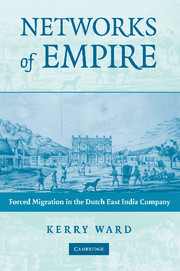
-
Select format
-
- Publisher:
- Cambridge University Press
- Publication date:
- July 2009
- December 2008
- ISBN:
- 9780511551628
- 9780521885867
- 9781107404731
- Dimensions:
- (228 x 152 mm)
- Weight & Pages:
- 0.6kg, 356 Pages
- Dimensions:
- (229 x 152 mm)
- Weight & Pages:
- 0.57kg, 358 Pages
You may already have access via personal or institutional login
Book description
This book argues that the Dutch East India Company empire manifested itself through multiple networks that amalgamated spatially and over time into an imperial web whose sovereignty was effectively created and maintained but always partial and contingent. Networks of Empire proposes that early modern empires were comprised of durable networks of trade, administration, settlement, legality, and migration whose regional circuits and territorially and institutionally based nodes of regulatory power operated not only on land and sea but discursively as well. Rights of sovereignty were granted to the company by the States General in the United Provinces. Company directors in Europe administered the exercise of sovereignty by company servants in its chartered domain. The empire developed in dynamic response to challenges waged by individuals and other sovereign entities operating within the Indian Ocean grid. By closely examining the Dutch East India Company's network of forced migration this book explains how empires are constituted through the creation, management, contestation, devolution and reconstruction of these multiple and intersecting fields of partial sovereignty.
Reviews
'… Ward's intriguing and suggestive detail will be a revelation for historians of South Africa.'
Source: Journal of African History
Contents
Metrics
Altmetric attention score
Full text views
Full text views help Loading metrics...
Loading metrics...
* Views captured on Cambridge Core between #date#. This data will be updated every 24 hours.
Usage data cannot currently be displayed.
Accessibility standard: Unknown
Why this information is here
This section outlines the accessibility features of this content - including support for screen readers, full keyboard navigation and high-contrast display options. This may not be relevant for you.
Accessibility Information
Accessibility compliance for the PDF of this book is currently unknown and may be updated in the future.


